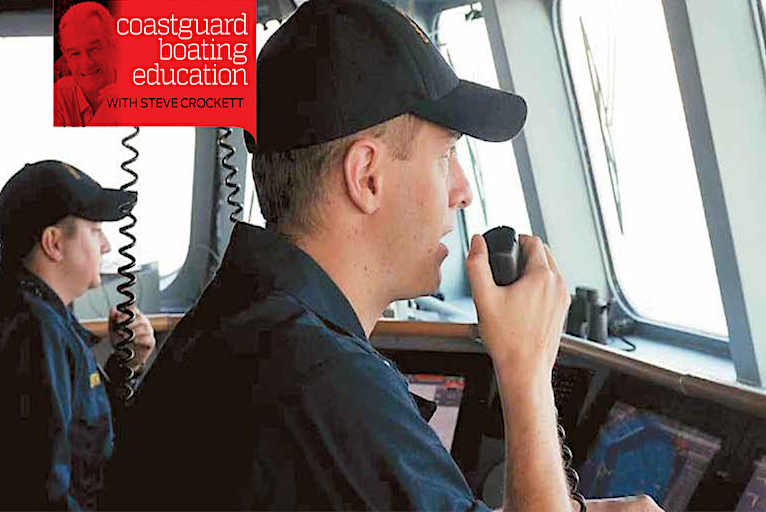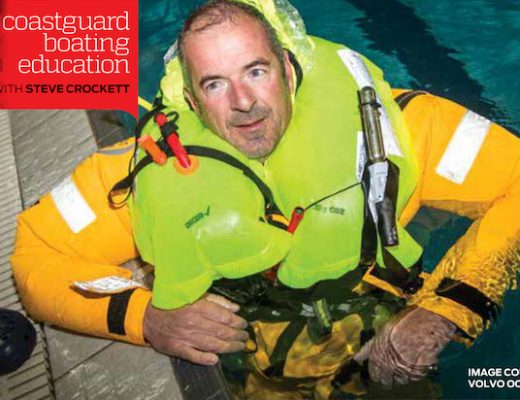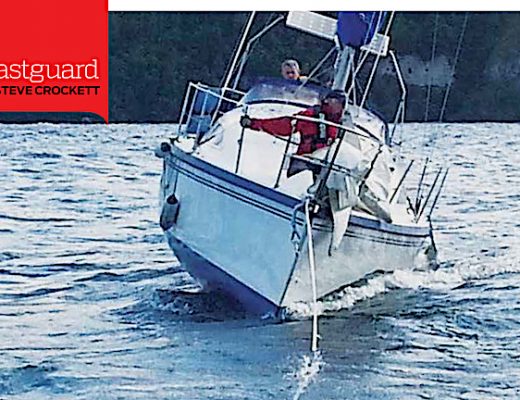THAT LITTLE SQUAWKBOX ON YOUR DASH MIGHT NOT GET USED MUCH, BUT WHEN THE WATER IS RISING AROUND YOUR ANKLES, YOU’D BETTER KNOWWHAT TO DO WITH IT.
I had an interesting, but not unusual encounter recently at the Auckland On Water Boat Show.
A man and his partner came to the Coastguard Boating Education stand and they were perusing brochures of the many courses of study we have on offer. I asked if I could assist them and the man said that he was “maybe thinking of booking a VHF radio course for … the little lady” but he was “not sure of how useful it would be.”
I took a deep breath and smiled ( to hide the fact that I was biting my tongue!) and enquired of him why he thought it may not be of use.
“ Well, we have a radio on the boat … but we never switch it on, though” he replied. “We can’t be bothered listening to all that chatter. Besides, we’re never far from shore. We’ll never have to call the Coastguard or anything”.
I imagined Neptune giving a wry smile right at that moment!
I said, “I’m reminded of a story my father once told me about another vessel which had turned off it’s radio. That vessel was named “Californian”. More than 1500 people died because that radio was unmanned. The year was 1912. The victims were passengers on the “Titanic”.”
That event brought about the introduction of the Radio Act of 1912, where ships were required to maintain a 24 hour listening watch, and of course the introduction of the International Convention for the Safety of Life at Sea, better known as SOLAS.
February 1999 saw the introduction of the Global Maritime Distress and Safety System ( GMDSS). This system combines a number of elements, both terrestrial and satellite, to provide an immediate and coordinated Search and Rescue response to any vessel in distress, anywhere in the world. One element, possibly the most misunderstood, is the Digital Selective Calling (DSC) radio.
A VHF DSC radio contains technology which is constantly monitoring VHF Channel 70, the DSC Distress Alerting channel, irrespective of what other channel you may be tuned to. There are some mandatory requirements for your DSC radio to be of use. You must have a Maritime Mobile Service Identity (MMSI) programmed into the device, and you should have it connected to a GPS system (some new sets have a GPS included within them). A Distress Alert can be made in 5 seconds. All you have to do is lift the cover of the Distress Alert button and push and hold that button for 5 seconds. The radio sends out a burst transmission, via Channel 70, which contains your MMSI and your GPS position. Every vessel fitted with a VHF DSC radio and which is within VHF range of you will be alerted by an alarm signal and their radio’s LCD screen will show your MMSI, the time, and, more importantly, your GPS position. This transmission is repeated every 4 minutes until it is acknowledged or cancelled. Your radio, and those of vessels receiving your Distress Alert, have now been automatically changed to Channel 16 ready to receive your voice “Mayday” call, should you have time to make one.
“But VHF DSC is not supported here in NZ”, I hear you say, and to a certain extent you are correct.
We do not have a shore-based infrastructure here to support VHF DSC, however, under SOLAS every vessel over 300 Gross Registered Tonnes engaged on an international voyage is required to have VHF DSC installed and monitored 24/7. As I write this I can see on my smartphone app that there are 23 vessels currently operating within VHF range and which have VHF DSC radios, and a further 100 or so within the confines of the Hauraki Gulf. On receipt of your DSC alert any one of those vessels can be of immediate assistance to you and will also relay your Distress to a SAR unit.
To really gain an understanding of how useful your VHF DSC radio can be I recommend you undertake a VHF radio course with Coastguard Boating Education. You’ll be amazed at what you can do with it.
But, don’t rely on old mate and his “little lady” to come to your aid. Their radio is turned off!





No Comments